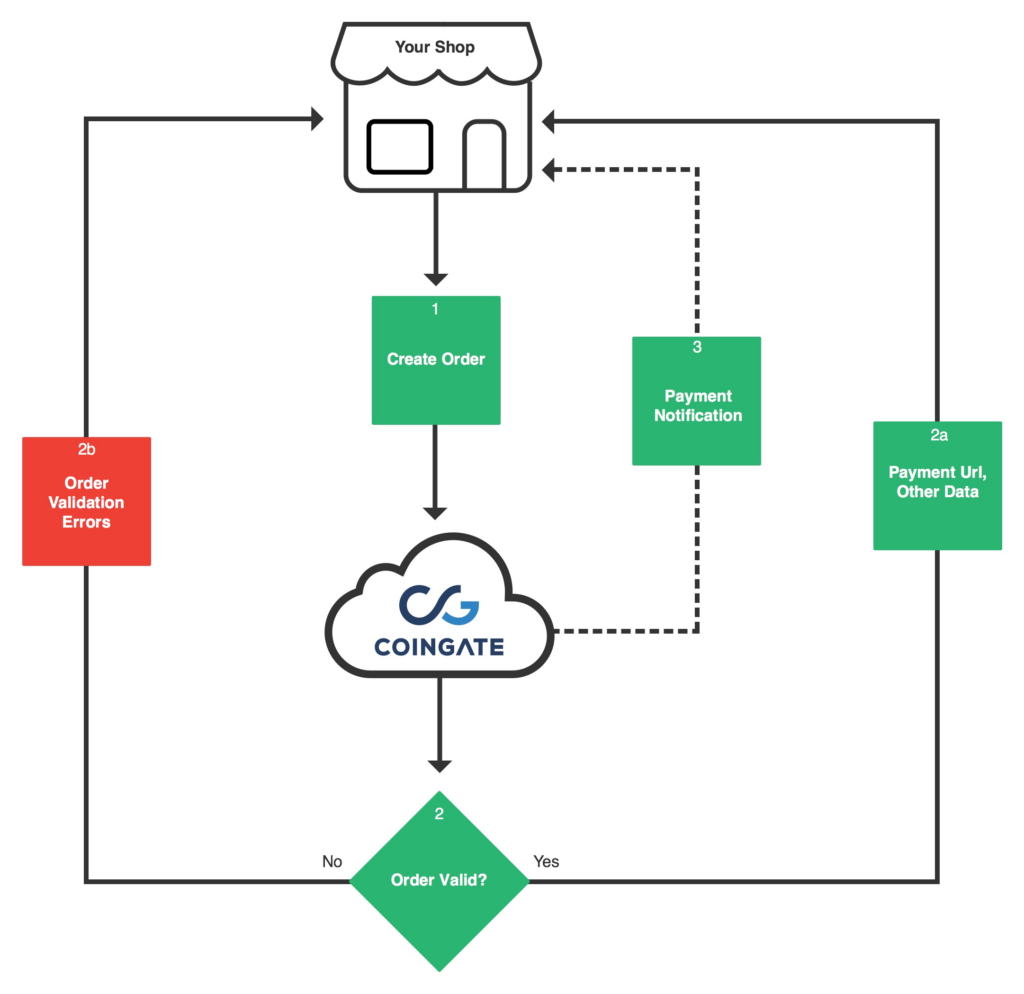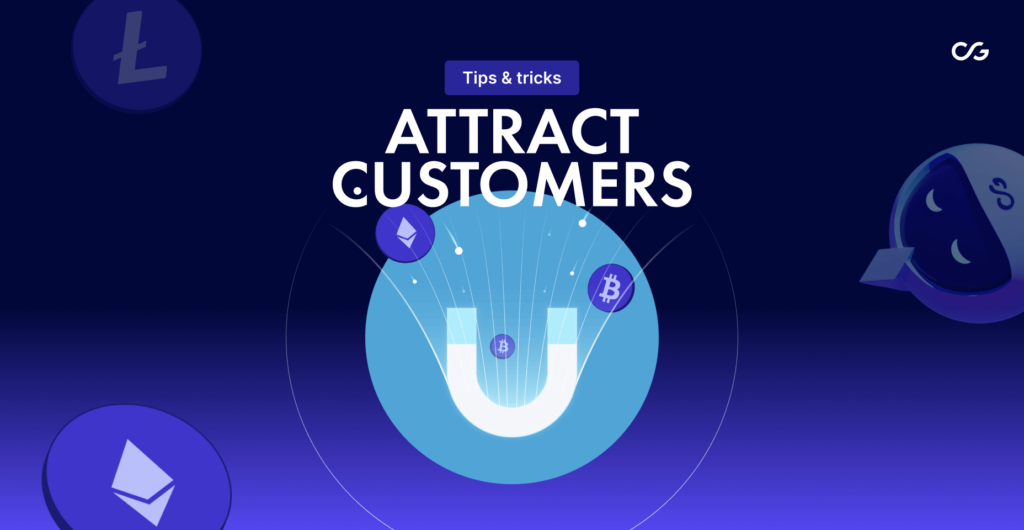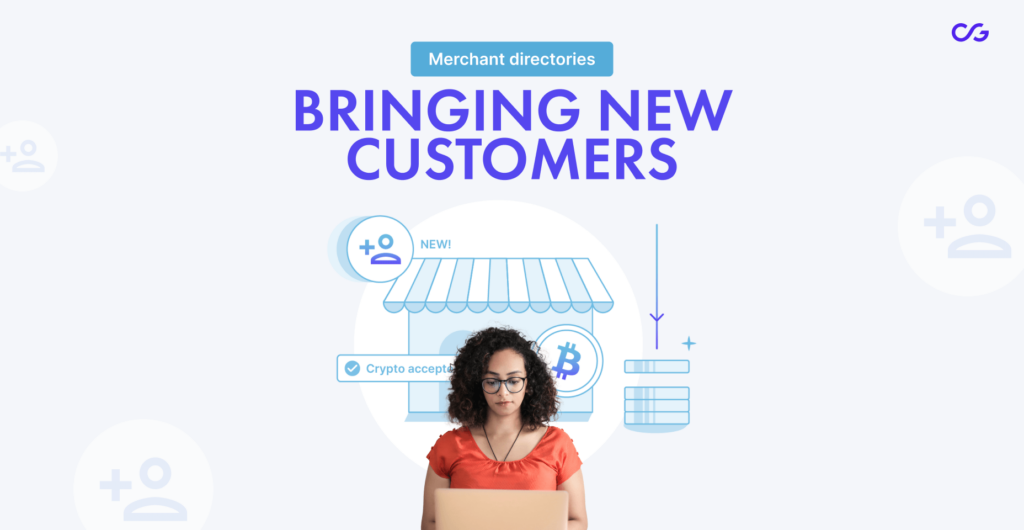Crypto Payments, E-Commerce Plugins, Educational, Getting started, Tutorials
How to Accept Bitcoin & Crypto Payments in an eCommerce Store?
Last updated: June 21, 2023 13 min read
Vilius B.
You’ve dabbled in Bitcoin, flirted with Ethereum, and now you’re wondering how you can integrate these digital payment powerhouses into your eCommerce store. Good!
The world of cryptocurrencies is no longer a realm explored solely by tech-savvy innovators or financial mavericks.
It’s a vibrant, dynamic marketplace that is shaping the future of commerce, and it’s high time your eCommerce store capitalized on this trend.
This article will delve into the ins and outs of accepting Bitcoin and other cryptocurrencies in your eCommerce store, highlighting the benefits, addressing the challenges, and presenting effective all-in-one solutions such as CoinGate, a leading crypto payment processor in Europe and beyond.
Understanding the Basics of Cryptocurrency and Bitcoin
Before we dive into the practical aspects of accepting crypto payments in your eCommerce store, it’s crucial to understand the basic concepts and significance of cryptocurrencies and Bitcoin.
Let’s set the groundwork, then. If you are well familiar with the concept of cryptocurrencies, skip ahead to their benefits for eCommerce stores.
Definition of cryptocurrency and Bitcoin
In essence, cryptocurrency is a type of digital or virtual currency that utilizes cryptography for security.
It operates on decentralized networks based on blockchain technology – an open, distributed ledger that records transactions between two parties in a transparent and immutable way.
Bitcoin is the first, most significant and well-known cryptocurrency, created by an unknown person or group of people using the name Satoshi Nakamoto.
The best thing a Bitcoin newbie can do is read the Bitcoin Whitepaper.

Importance of Bitcoin and cryptocurrency in eCommerce
The importance of Bitcoin and many other cryptocurrencies in eCommerce cannot be overstated.
Their unique features – decentralization, security, transparency, and the ability to perform transactions without the need for a central authority – make them well-suited to the digital nature of eCommerce.
By accepting cryptocurrencies, businesses can tap into a global customer base, reduce transaction costs, increase efficiency, enhance security and privacy, and that’s just the tip of the iceberg.
Reasons Why Your eCommerce Store Should Accept Cryptocurrency Payments
Now that we’ve covered the basics, it’s time to explore why accepting cryptocurrency payments could be beneficial for your eCommerce store. From rapid global adoption to enhanced security, the reasons are compelling and abundant.
Rapid global adoption of cryptocurrencies
As of now, there are millions of active cryptocurrency users around the globe and the number is only growing.
Accepting cryptocurrencies at your eCommerce store not only opens up opportunities to tap into this expanding user base and increase sales but also positions your business as innovative and future-oriented.

Enhanced privacy and security
Blockchain’s underlying technology ensures that every cryptocurrency transaction is secure.
Unlike traditional payment systems where personal data can be exposed, crypto transactions can be done with minimal or no personal information attached, offering enhanced privacy to customers.
Reduced transaction fees
Traditional banking systems and online money transfers usually involve fees and exchange costs.
Cryptocurrencies may minimize these costs significantly, as they are cheaper than what traditional payment rails offer. This can be a financial advantage for both businesses and customers.
Additionally, fees can be reduced even further by adopting layer 2 solutions. Payment processors like CoinGate are known to adopt layer 2 technologies on their payment rails, such as Lightning Network, Polygon and Arbitrum.
Access to a broader, global market
Cryptocurrencies operate on a global level, unconstrained by national borders, and help you reach even those customers that do not have access to banking services.
Accepting cryptocurrencies can also help your eCommerce store reach a global audience without the complications of currency conversion and international transaction fees.
Potential Challenges of Accepting Cryptocurrency Payments
While cryptocurrencies offer immense potential, they also come with their own set of challenges in every region.
In this section, we’ll address these potential hurdles, such as volatility and regulatory complexities, to prepare you for your journey into the crypto economy.
Luckily, with the right approach, all challenges can be overcome.
Volatility of cryptocurrency prices
One of the most significant perceived challenges of accepting cryptocurrency payments is the inherent volatility of cryptocurrency prices.
The logic is, because crypto prices can fluctuate dramatically, it can potentially lead to substantial losses for your eCommerce business.
However, better payment processors have mechanisms to mitigate volatility for merchants.
Regulatory uncertainties and complexities
Cryptocurrency regulations vary from country to country, and often even within the same country.
These regulatory uncertainties and complexities can make it challenging for eCommerce businesses to navigate and remain compliant.

However, tides are turning as places like the European Union (EU) are setting the stage for the implementation of its new Crypto-Asset Regulatory Framework by the end of 2024.
The two key pieces of legislation driving these changes are the Markets in Crypto-Assets regulation (MiCA) and the Transfer of Funds Regulation (TRF), which bring much needed regulatory clarity in the region. Read more.
Technological aspects and integration difficulties
One might think that implementing the infrastructure to accept multiple cryptocurrencies with crypto-to-fiat bridge requires significant technological changes to your existing eCommerce platform.
It can definitely be a challenging task, especially for businesses with limited technical resources or expertise who explore open-source solutions like BTCPay Server.
However, plenty of well-oiled solutions exist that can help you overcome these challenges with ease.
Overcoming the Challenges: The Role of Crypto Payment Processors
Adopting new technology may seem daunting, but with the right tools, it can be a breeze. That’s where crypto payment processors come in.
They can play a pivotal role in addressing the challenges and simplifying the process of accepting cryptocurrency payments for businesses of any size and any type.
Explanation of how crypto payment processors work
Crypto payment processors act as intermediaries in cryptocurrency transactions.
They facilitate transactions between the buyer and seller, providing payment infrastructure and handling the entire payment process.

They also offer a service of converting cryptocurrencies into traditional fiat currencies on the spot, ensuring businesses receive the correct amount regardless of crypto price fluctuations.
In addition, payment processors often offer numerous additional tools and features merchants are bound to find useful.
The role of crypto payment processors in addressing challenges of accepting cryptocurrency
CoinGate, as a payment processor, plays a crucial role in mitigating the challenges of cryptocurrency payments adoption.
- It provides a stable conversion rate at the time of sale;
- It protects against crypto volatility;
- It ensures regulatory compliance;
- It offers easy integration methods with several popular eCommerce platforms.
For example, CoinGate offers official plugin integrations for major eCommerce sites like Wix, WHMCS, WooCommerce, PrestaShop and others, immensely simplifying the entire process and eliminating potential technological challenges.

Besides plugins, companies can also use easy payment acceptance tools like email invoicing or payment buttons, or set up cryptocurrency checkout on their website using a powerful CoinGate API.
What do customers say about CoinGate?
CoinGate has published multiple case studies delving into how and why merchants decide to start accepting crypto payments, how it benefits their customers and business, and what problems it solves.
- Cherry Servers attracted more customers worldwide, including people that do not have access to banking services;
- Surfshark found a way to provide services to their most privacy-conscious customers;
- IPRoyal finally managed to meet their customers’ demands.
That’s just several examples. Find all case studies here, or read a summary of all CoinGate case studies.
More About CoinGate, a Leading Crypto Payment Processor
In this section, we’ll take a closer look at CoinGate’s major features, ways of addressing the most common customer concerns, and how the solution can help eCommerce stores smoothly transition to a crypto-friendly business.
Introduction to CoinGate
CoinGate is an industry veteran of crypto payment processors. For years, it has been enabling businesses to accept Bitcoin and other cryptocurrencies as payment for goods or services.
Founded in 2014, CoinGate has grown to support over 70 cryptocurrencies over multiple blockchain networks and provides a suite of features designed to make the integration and use of cryptocurrencies seamless and efficient, particularly in eCommerce.
And, with a recent partnership and integration of Binance Pay into CoinGate, sky’s the limit.
Features of CoinGate that benefits eCommerce stores
CoinGate offers a myriad of features that make it an excellent option for eCommerce stores, besides instant currency conversion, regulatory compliance, and support for multiple cryptocurrencies.
It also provides a variety of payout options, allowing businesses to choose between receiving payouts in cryptocurrencies or traditional fiat currencies, such as EUR, GBP or USD.
Here’s more useful tools merchants have at CoinGate:
- Issue different types of refunds in cryptocurrencies;
- Assign roles and manage account permissions;
- Enjoy flexible payout settings and multiple settlement currency choices;
- Build your subscriber list and send periodic or one-time bills;
- Customize your invoice page;
- Use in-house cryptocurrency trading services.
How CoinGate handles volatility and regulatory hurdles
In CoinGate’s case, the volatility is mitigated by converting cryptocurrencies to traditional currencies at the rate when payment was received, which allows bypassing the volatility risks.
CoinGate handles the volatility of cryptocurrency prices by immediately converting crypto payments into a stable fiat currency of the merchant’s choice (optional).
This ensures that merchants receive the full value of the sale, regardless of any subsequent price changes in the cryptocurrency used.
For regulatory compliance, CoinGate adheres to strict KYC/AML regulations and proactively gets ready for changes prompted by MiCA, thus providing peace of mind for eCommerce merchants that their payment infrastructure is in trusted, regulated and compliant party.
Steps to integrate CoinGate into your eCommerce platform
Integrating CoinGate into your eCommerce platform is a straightforward process.
Simply download an official plugin or extension from your eCommerce platform’s backend. After creating and verifying a CoinGate account, you will be able to enable the CoinGate payment option at your store.
CoinGate provides direct integration methods for many popular eCommerce platforms.
Find extensive step-by-step installation guides for installing all plugins or extensions supported by CoinGate.
Tips on How to Make Crypto Payments in Your Store a Success
Ready to welcome cryptocurrencies to your eCommerce store? Great!
Now let’s go through some practical tips on how you can make this transition as successful and seamless as possible for you and your customers.

Be sure to check out more ways to market your business as a crypto-friendly establishment.
Ensuring a seamless customer experience
While adding a new payment option to your eCommerce store, it’s essential to ensure that the customer experience remains seamless.
You should test the cryptocurrency payment process to ensure it is as intuitive and straightforward as your other payment methods.
For example, CoinGate provides a Sandbox testing environment where merchants can get familiar with integration tools before starting using them.
Educate customers about crypto payments
Cryptocurrencies might still be a new concept for many of your customers. It’s important to inform and educate them about this new payment option.
You can use your website, email newsletters, blog posts, and social media to explain what cryptocurrencies are, how to use them, and their benefits.
Add your website to business directories
Numerous business directories exist where companies can display their online or brick-and-mortar stores to gain more visibility and outreach.
Certain directories are specifically designed for businesses that welcome cryptocurrency, thus enabling you to connect with your desired audience more efficiently.
This straightforward step helps potential clients who favor cryptocurrency transactions locate you with ease.

Here are Top 3 crypto merchant directories to check out.
Future of Cryptocurrency in eCommerce
The intersection of cryptocurrency and eCommerce is set to redefine the future of online retail.
Let’s examine the role of blockchain technology, the growing user base of cryptocurrencies, and the evolving services of crypto payment processors in shaping this future.
The impact of blockchain technology on eCommerce
Blockchain technology, the foundation of cryptocurrencies, has a transformative potential that extends beyond facilitating crypto transactions.
Its attributes of transparency, immutability, and decentralization are poised to reshape numerous aspects of eCommerce, from enhancing supply chain transparency to creating more secure and customer-friendly reward programs.
Predictions for the growing user base of cryptocurrencies
As cryptocurrencies become increasingly mainstream, the user base is expected to grow exponentially. Our own study and overview of 2022 crypto payments performance suggests exactly that, showing a staggering 63% increase in payments volume compared to 2021.
For eCommerce businesses, accepting crypto payments could mean tapping into a rapidly growing market segment, attracting a new demographic of tech-savvy, privacy-conscious customers.
The evolving services of crypto payment processors like CoinGate
CoinGate is consistently updating its solutions to meet the evolving needs of businesses and consumers.

It supports a wide variety of cryptocurrencies, offering features that facilitate easy and safe transactions, while continuing to develop new solutions and improve the existing ones to make the acceptance of crypto payments even simpler.
The Bottom Line: It’s Time to Embrace Cryptocurrencies as the Future of eCommerce
As we approach the end of this crypto journey, it’s time to reflect on what we’ve learned, understand the strategic importance of embracing cryptocurrencies in eCommerce, and how you can leverage crypto payment processors like CoinGate to ease this transition.
The strategic importance of accepting cryptocurrencies in eCommerce
Embracing Bitcoin and other cryptocurrencies is more than just keeping up with a trend—it’s a strategic decision that can unlock a world of opportunities for your eCommerce store.
With the increasing acceptance and use of cryptocurrencies, businesses that adapt early to this change will have a competitive edge.
The role of crypto payment processors in the transition to accepting cryptocurrencies
Crypto payment processors like CoinGate provide a seamless and secure way to integrate cryptocurrencies into your eCommerce store.
They help tackle the challenges that come with accepting cryptocurrencies, including price volatility and regulatory complexities, offering a safe and straightforward way to step into the crypto economy.
Embracing the crypto economy
The crypto economy is here to stay. Embracing it is not just about getting ahead—it’s about not being left behind.
Knowing how to accept crypto in eCommerce store can lead to broader market access, improved customer experience, and an enhanced brand image as an innovator.
The future of eCommerce is entwined with crypto—are you ready to join the revolution?
Written by:
Vilius B.
Knows as much about VPN as it is healthy for someone who isn't a VPN developer. Testing more text to see how it looks like. And a little bit more toblerone and on and on.
Knows as much about VPN as it is healthy for someone who isn't a VPN developer. Testing more text to see how it looks like. And a little bit more toblerone and on and on.
Related Articles


